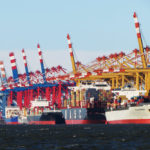With governmental backing the emirate of Dubai has an ambitious goal: to become one of the leading maritime hubs in the world. HANSA talked to , Head of the new Maritime Cluster office, about strategy and advantages
What is the goal of Dubai, where do you want to be in five years?
Nawfal Al-Jourani: Actually, we do have a five-year plan. Our goal is very simple. We want to become the destination of choice for maritime businesses, be it primarily shipowners or all the businesses that might follow. The concept of a cluster is a critical notion for us, because that is the add-on value that we bring in to investors and all interested parties. We want to create a 360 degrees business environment.
Including fields like finance, insurance?
Al-Jourani: Everything. However, our unique selling point is very simple. We focus on a culture of innovation that will encourage the growth and best-practise applications. We have a zero-tax-regime, one of the worlds best infrastructures and a group of the best talents in every field. On top of that we have a government that is not shying away from risk, a government that is business friendly and that totally realises the importance of a public-private-business system. We cannot even have a cluster without having private business.
For us innovation is the key factor, not technology. People misunderstand innovation as technology, but for us it is the way of thinking, the way of life, inventing ourselves on and on.
Dubai is not part of one of the main shipping routes. Is this a disadvantage?
Al-Jourani: In the Arabian Gulf the physical location is very important, I agree. But the industry is global, and it is the product-added value, that is followed. Dubai has a product, that attracts people to join: A vision of transparency and freedom to do what you like to do with your capital.
Does your strategy include to be one of the leading hubs already in five years?
Al-Jourani: It is a first step.
When do you plan it to be?
Al-Jourani: Let me tell you a little story about Dubai and the Emirates. Our strategy as a nation is always favouring the No. 1. We love that, it is our philosophy. We are blessed with our leadership, which actually dreams about people realizing happiness. This is triggered through real-life business and government policy. According to third-party reports, Dubai is now under the Top 10, in terms of the most favourable cluster destinations to do business in the maritime world. People say that we do the same that Singapore did ten years ago. For me this is a great assessment. Best practise is what everybody is after. You don´t need to reinvent the wheel, what you need to do is to create a platform that encourages innovation and inspiration, to have people do the things they love to do at work. You think I am exaggerating, but honestly everybody in Dubai has that energy, this is thanks to our leadership.
Do you compete with other hubs?
Al-Jourani: We don’t compete with anyone, we compete with ourselves and our goal of excellence. We work closely together for example with the Hamburg cluster office, we have a Memorandum of Understanding with the Singaporian cluster office. We learn from them, we appreciate whatever they have achieved and we aspire to have a product that complements what they need in the Middle East region. If I were a shipowner, it would be in my best interest that my lines go to a thriving maritime cluster in Dubai as it is in Singapore. And you know why? Because then you have a globally standardized quality and then it will make life easy, that is why we try to have arbitration and to have training.
How much money is the government investing to attract business?
Al-Jourani: The monetary investment is very very sizeable, in the sense of the volume the sector has itself. It runs 75,000 jobs with a turnover of 15 bn UAE dirhams annually. You have to differentiate hardware and software investment. The investment in the hardware, the infrastructure is well known. Now we are establishing an arbitration centre, the maritime city, an advisory centre. These will help us and inform us about what the industry needs. We have good ears listening to our story because of the potential that is available.
Michael Meyer




















